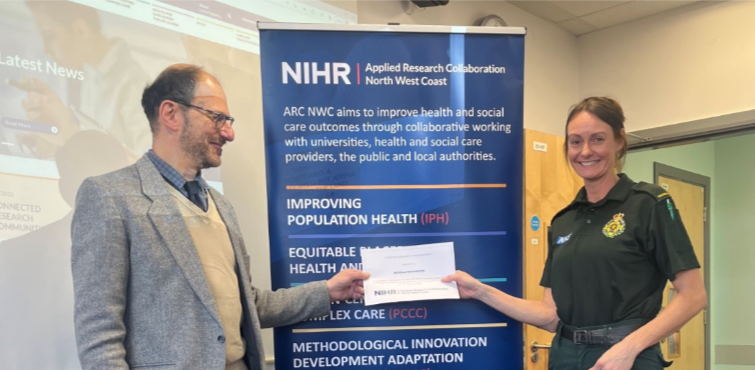Michelle responds on blues and twos to her research call

Paramedic Michelle Waddington, of North West Ambulance Service (NWAS) NHS Trust, is aiming to identify inequalities faced by end-of-life patients receiving paramedic care, through her 12-month Data Science Internship with ARC NWC.
The North West region, which has a population of over seven million people, requires NWAS to cover over 5,500 square miles – the communities of Cumbria, Lancashire, Greater Manchester, Merseyside and Cheshire.
A data set for end-of-life patients will be extracted from the 1.3 million 999 calls the Ambulance Service receives per year, which equates to 16% of the national 999 calls received. This will then be interrogated to identify any health inequalities in service provision across the region.
Michelle, who has been NWAS or over sixteen years, said:
“The research will explore the care provided to end-of-life patients by paramedics whilst identifying and analysing inequalities which patients can face. It will consider which demographic characteristics are a contributing factor in creating these inequalities. For example, does where the patient live impact on their level of care and we will try to understand why these variations exist and how we can tackle them.”
From her base in East Lancashire, Michelle helps provide emergency cover to communities in both Blackburn and Preston. She adds:
“End-of-life patients from higher deprived areas can often be diagnosed at a later stage and therefore rely on the ambulance service a lot more. So, in relation to the north west, we want to find out these areas require more input from the ambulance service and the wider NHS. Additionally, we want to find out if these communities are getting access to the community services they really need.”
Previous research in this area has suggested there is need to improve education around end-of-life care choices for patients who could end up dying in hospital, when their preference may have been to receive care at home or in a hospice.
Michelle is keen to outline the importance of the research in context of the daily realities faced by both her and her colleagues:
“We treat end-of-life patients as best as we can, but there is a gap in ensuring that information about available services are made accessible to the patient at the earliest possible opportunity. “
Michelle is also assisting a fellow NWAS colleague in their ARC NWC Mental Health Internship application, explains how she explored the possibilities of undertaking research before taking the plunge. “I wanted experience in the research field and found out that there was an internship coming up with ARC NWC with support and advice from the internal NWAS team I decided to apply.
“At first, I found the research aspects of the project a minefield because I’d never done anything like this before. However, I have been really supported in the process and I have a great team around me guiding me through each step of the project.”
“Having an internship is massive opportunity as you are still getting paid, your position is backfilled by ARC NWC, and you’ve got the support of academics and access to expertise around you.”
Michelle added: “The internship has benefited both me and my organisation as thanks to ARC NWC, both my line manager and I have been able to commit a specific day each week to dedicate to my research without it having an impact on front-line service.”
Anticipated outcomes from the project include recommendations for consideration to improve service delivery, training and approaches to treatment options for end-of-Life patients. This will benefit NWAS immensely and is using its own data to improve service delivery, but I couldn’t have undertaken this without the support of ARC NWC and colleagues.”
Feeling grateful for the support through her internship journey to date, Michelle is keen to flag up her support system of new colleagues across The University of Liverpool, Lancaster University and NWAS.
“I have a direct link with Dr Pete Dixon, theme manager at ARC NWC in Liverpool, who meets with me every week and he guides me through the processes of research. We’ve gone through the process of collecting the 999 data from NWAS and now we’ve received that data, and we’re just in the process of cleaning it up for analysis.”
Professor Nancy Preston from Lancaster and Dr Maddy French from Lancaster University have been instrumental in navigating me through my research journey and I have strong support from colleagues Sandra Igbodo, Research Manager, and Kieran Potts, Regional Lead for Palliative and End-Of-Life Care within NWAS, who have offered unwavering support in my development.”
Kieran said, “Michelle has put huge trust in the internship and in ourselves as a team, and it is certainly paying significant dividends, both to her own knowledge and to our collective organisational knowledge and relationship development”.
Michelle elaborates, “One of the main challenges of the project so far is ensuring the data is confidential so no patient can be identified and abide by the code of ethics conduct. Since undertaking my internship, it has opened so many doors and allowed me to work develop professionally in the background of my current job.
Activities have included sitting on panels with advanced paramedics for NWAS, presenting my research at the ARC NWC internship showcase (pictured) and presenting at the Palliative Care Research North West coast event.
I have even been featured on the NHS website to celebrate their Birthday 75th celebrations (https://www.england.nhs.uk/nhsbirthday/your-nhs-stories/#michelle-waddington)”
Find out more about the ARC NWC internships here (Our next round of research internships have been announced – NIHR):